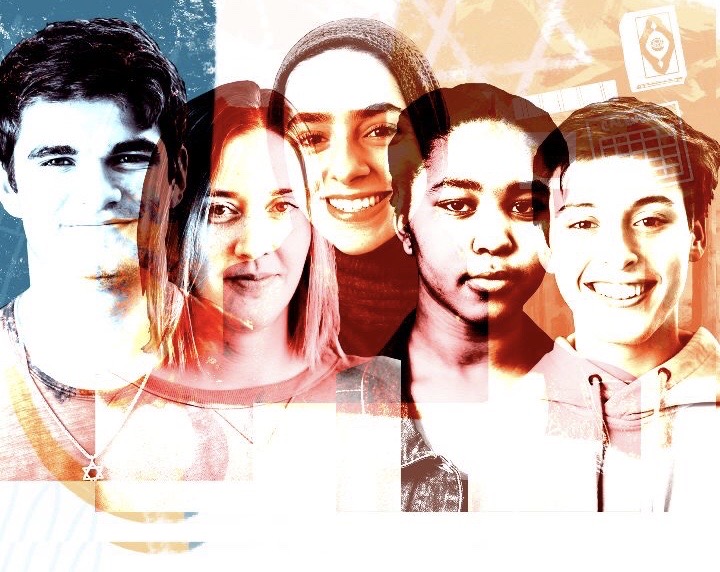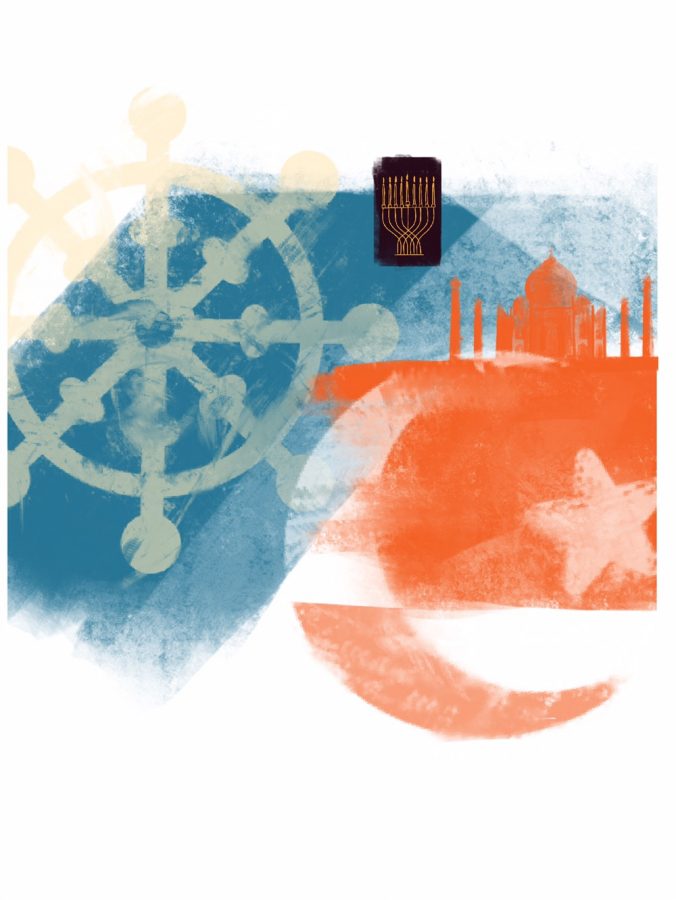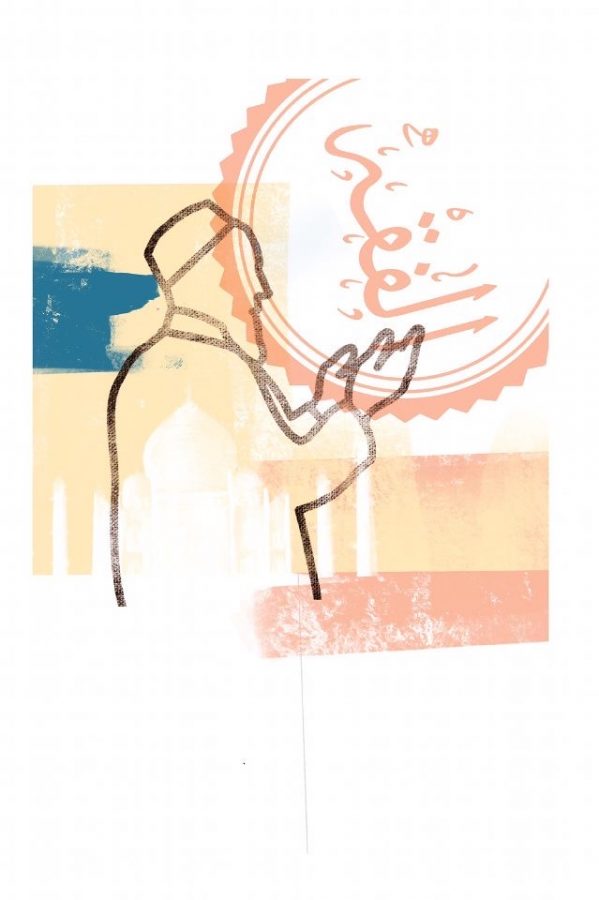Your donation will support the student journalists of West High School. Your contribution will allow us to purchase Scholarship Yearbooks, newsroom equipment and cover our annual website hosting costs.
How accommodating is the ICCSD when it comes to religion?
Fighting for faith
With the holiday season upon us, West Side Story is taking a deeper look into how religion is addressed in the ICCSD and the obstacles many students have to overcome in order to attend school during major holidays in their religions.
December 20, 2019
It’s that time of year again. The bitter December wind whips through the air, bringing with it an equally chilling obstacle for students: the influx of exams crammed in before break. When the seemingly endless piles of work after Thanksgiving finally start to melt away, students are awarded a two-week break from school to spend time with family. For those who celebrate Christmas, this break is filled with celebrations and gift-giving. For students practicing religions other than Christianity, having a school sanctioned break from classes during their religious holidays is not always an option. Holidays like Ramadan and Yom Kippur that typically fall during the school year pose several obstacles for these students when they have to miss school days in order to celebrate. Religious practices, including fasting, further affect students when they have to deal with the effects during the school day. Fasting is a practice that religions have used for centuries as a way to exercise sacrifice, self-discipline, cleansing and gratitude. Many students struggle to concentrate during fasting and even have to miss school from time to time. Fasting is just one example of a religious practice that the Iowa City Community School District (ICCSD) addresses in their religious policies.
Intents of the district
When it comes to religion, the ICCSD aims to create an environment that is inclusive to everyone. They try to achieve this through policies and guidelines that have the intent of making it easier on students whose religious practices conflict with the school schedule.
“One of the things that we are very conscious of is that it’s clear to the students, staff and the communities that as a public school, we are open to everybody,” said Superintendent Steve Murley. “Our goal is to accommodate people’s needs when they come through our door, regardless of socioeconomic status, race, ethnicity, language spoken and religion.”
An obstacle that students practicing religions other than Christianity face is trying to stay on top of schoolwork when they have to be absent from school. The ICCSD has a written policy requiring the school to excuse any absences due to religious celebrations. This makes certain that students don’t feel pressured to attend school instead of celebrating a holiday.
“One of the things that we’ve been working very hard to do is to ensure that we are a truly responsive school district and that we are proactive,” Murley said. “We try to determine where areas of conflict may lie, and then [we try] to develop resolutions to those conflicts.”
In order to resolve conflicts between religion and schooling, Murley works with local Muslim, Jewish and Christian religious leaders to create a religious calendar provided to ICCSD staff. This calendar includes the major holidays that the main religions in the district celebrate to make sure that teachers are aware of certain days that students might have to miss.
“I actually went and met with the imam at the mosque and the rabbi over at the temple and a couple of Christian religious leaders, and I had them help me determine … what the most important religious holidays that fall during the
school year were,” Murley said. “Then we talked to accommodate student needs when they were in conflict with school.”
A common practice for many religions, one that the ICCSD tries to incorporate into their goal of inclusivity, is praying. A significant part of many students’ religions includes praying at times that fall throughout the school day. Massa Suleiman ’22, who is Muslim, feels that the school is quite amenable to this practice.
“[The school] offers us rooms in the West Wing Office to pray,” Suleiman said. “Teachers are also very understanding when I need to come to class a bit late.”
Although providing a space for students to pray is not included in an official policy, the district makes it clear that schools ranging from elementary to secondary should have a safe space for students of all religions to pray during the
school day.
“Our whole goal is to make sure that school is a welcoming place for everyone — students, staff, parents and the community,” Murley said. “We make school that welcoming place by recognizing that [we all] come from many and varied backgrounds, and that’s what makes our district such a great place to go to school.”
While the ICCSD does have policies in place to assist certain major religious holidays, there are many obstacles that some students feel go unnoticed in their classes. For Suleiman, she finds it very important that both the student population at West, as well as its staff, continue to learn about what a large number of students are going
through when missing school on major religious celebrations.
“I think it’s very important that Islamic [and other non-Christian religious] holidays are at the least recognized by teachers and staff so they are more understanding when we miss school,” Suleiman said. “Just awareness of what a large percentage of the school districts students are going through would be very accommodating.”
An added obstacle: testing
A school year’s worth of material crammed into just over three hours of testing. Fifty-five multiple choice questions, three short answer questions and the ever-dreaded long essay question and document-based question. As stressful as an AP exam can be, students like Razan Hamza ’21 faced an additional obstacle last year when their AP exam overlapped with the celebration of Ramadan.
In the spring of 2019, West students took the AP European History exam on May 6, the same day Muslims across the world celebrated the start of Ramadan, a holiday in which they fast from sunrise to sunset. Hamza remembers multiple occasions where she had to take a test on a day that she was fasting, but the AP Euro exam was the one that stuck out the most.
“I was extremely worried,” Hamza said. “I was thinking, ‘Taking this test while dehydrated is probably going to be the worst decision I’ll make this year.’”
Hamza isn’t the only student who has faced difficulties regarding the AP testing period and fasting.
“Fasting during an AP test is something that has happened multiple times that I’ve had students talk to me about,” AP Human Geography teacher Megan Johnson said. “I don’t think that there’s any formal accommodations for those students where you can take it at a different time or anything like that.”
Due to the lack of accommodations provided by the College Board, students have had to create an individual plan to work their fasting schedule around the exam. This includes getting up before sunrise to eat a big meal, or breaking
their fast on the day of the exam and making it up on an extra day.
“I think that it does become difficult for some students, particularly if you have an afternoon test,” Johnson said. “There’s not any sort of formal policy that I’m aware of from College Board, but my experience has been that the individual students find their own ways of navigating through it.”
For students who cannot attend the regularly scheduled AP exam, College Board offers an option to sign up for a make-up exam later on in May. The late testing date is available free of additional charges for circumstances including a bomb or fire scare, an athletic event, another AP test at the same time or religious celebrations. This year, however, both the normal exam weeks and the make-up exam weeks will fall during Ramadan, as it lasts from April 23 to May 23 in the 2020 year.
It’s not just AP tests that can overlap with religious celebrations. Evan Zukin ’22 remembers a recent stressful time when he had multiple tests to make up after missing a single day of school.
“One time this year I had three tests on the same day as [Yom Kippur] and I spent the next week making them all up,” Zukin said. “[My teachers] were all accommodating, and they understood that I had to miss that day.”
Although there’s no district policy that prevents teachers from giving tests on major religious holidays when students may be out of school, the district’s guidelines strongly encourage ICCSD staff to keep the celebrations in mind while planning their courses.
“We go over that [religious] calendar that all staff members can see once a year, and we remind them that it is our intent — not a policy, but our intent — that they not hold exams on the holy days in particular for Christianity, Judaism and Islam,” Murley said. “The intent is not to have major assignments due or major tests on those dates or in the days immediately following.”
The calendar conundrum
It is the policy of the ICCSD not to discriminate on the basis of religion in its educational programs, activities or employment practices. If a student ever needs to miss classes for a religious reason, this absence will be excused by the administration.
Even though these students’ absences are approved, having to miss class can be very stressful for a high school learner. While the ICCSD cannot accommodate every religion and each of their holidays, they look at many different components when determining the calendar, including the University of Iowa calendar as well as the breaks in between the trimesters. However, the one consistency over the years has been two weeks off for winter break that coincides with
the Christian holiday of Christmas.
In recent years, the district has seen a push for more days off of school for Islamic holidays. According to Johnson, several people have spoken out about this at school board meetings, but nothing has moved forward as of yet.
“I know there have been a lot of community members who have expressed their desire for that to happen at school board meetings,” Johnson said. “We take days off all the time for other reasons, whether it’s Christian religious holidays or taking the day off between trimesters, so there’s no reason it couldn’t happen.”
One Islamic holiday in particular has been brought to the school board’s attention by the community. For the past couple years, Eid al-Fitr, a celebration in which the month-long fasting of Ramadan comes to an end, has fallen
over the summer months. However, because the Islamic faith follows the lunar calendar, the holiday will overlap with school days in a few years.
“We’ve actually talked to the calendar committee about whether or not we will have those days off [for Eid],” Murley said. “We’ve also talked to the rabbi to see if we’re recognizing those other specific Jewish holidays that we should also consider, so we’re trying to make sure again that we’re being as inclusive as possible in that process.”
Due to the length of Ramadan, it’s impossible for the district to take a whole month off of school, leaving students who celebrate it with some added challenges. One of these impediments arises when students taking PE classes are unable to participate at a full level during fasting.
“Individual days are easier to deal with. It’s Ramadan that’s very difficult for everybody. [It] creates its own little set of circumstances that are hard,” PE teacher Charles Stumpff said. “But we have given them the choice of how they want to
go about doing that.”
Students are allowed to choose the extent at which they participate in PE during this holiday, whether that means sitting out entirely or modifying workouts. However, according to Suleiman, the inconsistency between teachers and schools can sometimes result in students being pushed to their physical limits.
For Boaz Abramoff ’22, who in addition to being Jewish, is a devoted football and track and field athlete, finding a way to manage academics and sports along with his religion can be difficult at times, especially when it comes to missing school.
“It can be hard because both school and my religion are very important to me, so normally what I do is go to school for part of the day then miss a few classes so I can go to services at the synagogue. I get back to school in time to go to
practice because sports are important to me as well,” Abramoff said. “I think it’s important to keep a good balance of things you care about in life, like faith, academics and athletics.”
Although Christmas remains the only religious holiday that consistently falls during a break from school, Murley hopes that the district will remain open-minded and accommodating of all students, regardless of their religion, in the
future.
“Whatever we can do to ensure that we are being culturally responsive and proactively religiously tolerant makes for a more welcoming environment,” Murley said. “If we can succeed at that, we know that kids are better able to learn
and become successful students.”






